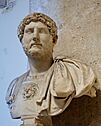Nerva–Antonine dynasty facts for kids
The Nerva–Antonine dynasty was a group of seven Roman emperors who ruled the Roman Empire from 96 AD to 192 AD. These emperors were Nerva, Trajan, Hadrian, Antoninus Pius, Marcus Aurelius, Lucius Verus, and Commodus.
The first five emperors in this group are often called the "Five Good Emperors". This is because they were known for ruling well. Most of these emperors chose their successors by adopting them. This was common in Roman society. It helped keep the empire strong and peaceful for a long time.
However, when Marcus Aurelius chose his own son, Commodus, to be emperor, things changed. Many people believe this choice led to problems for the empire. The Nerva–Antonine dynasty ended when Commodus was killed in 192 AD. After that, there was a short period of trouble before a new group of emperors, the Severan dynasty, took over.
Contents
History of the Nerva–Antonine Emperors
Nerva and Trajan's Rule
Nerva was the first emperor of this dynasty. He ruled for a short time, from 96 to 98 AD. During his rule, he helped bring peace between the army, the Roman Senate, and the common people. Nerva adopted a popular military leader named Trajan to be his successor.
Trajan became emperor in 98 AD and ruled until 117 AD. He was a very successful emperor. After Trajan, Hadrian became emperor. Hadrian said that Trajan had adopted him just before he died. Hadrian ruled from 117 to 138 AD.
The Antonine Emperors
The emperors known as the Antonines are Antoninus Pius, Marcus Aurelius, Lucius Verus, and Commodus. They ruled from 138 to 192 AD.
In 138 AD, Emperor Hadrian chose Antoninus Pius as his adopted son and heir. Hadrian asked Antoninus to also adopt Marcus Aurelius and Lucius Verus. Antoninus Pius became emperor that same year. He had a peaceful and kind rule. He followed Roman traditions and worked closely with the Roman Senate.
When Antoninus Pius died in 161 AD, Marcus Aurelius and Lucius Verus became co-emperors. They ruled together until Lucius Verus died in 169 AD. Marcus Aurelius continued to rule alone. He was known as a smart and humble leader. He died in 180 AD. His biological son, Commodus, then became emperor.
The Five Good Emperors
The emperors known as the "Five Good Emperors" were Nerva, Trajan, Hadrian, Antoninus Pius, and Marcus Aurelius.
A writer named Niccolò Machiavelli first used this term in his book The Discourses on Livy in 1531. He believed that these emperors were good rulers because they were chosen by adoption, not because they were born into the ruling family.
Machiavelli also said that these adopted emperors did not need a huge army to protect them. Instead, they were protected by their good actions, the loyalty of their people, and the support of the Senate.
Another historian, Edward Gibbon, wrote that the rule of these emperors was a time when the Roman Empire was led by wise and good leaders. He thought their fair policies were very unusual compared to the harsh rulers who came after them.
Why Adopted Emperors?
One idea about why these emperors adopted their successors is that they simply did not have sons of their own. Most of these adopted emperors did not have biological sons who could take over after them. So, they had to choose someone else to be the next ruler. When an emperor did have a biological son, like Marcus Aurelius, they usually chose their son to be the next emperor.
The Nerva–Antonine dynasty can be divided into two parts: the Nerva–Trajan dynasty and the Antonine dynasty.
Nerva–Antonine family tree
|
|||||||||||||||||||||||||||||||||||||||||||||||||||||||||||||||||||||||||||||||||||||||||||||||||||||||||||||||||||||||||||||||||||||||||||||||||||||||||||||||||||||||||||||||||||||||||||||||||||||||||||||||||||||||||||||||||||||||||||||||||||||||||||||||||||||||||||||||||||||||||||||||||||||||||||||||||||||||||||||||||||||||||||||||||||||||||||||||||||||||||||||||||||||||||||||||||||||||||||||||||||||||||||||||||||||||||||||||||||||||||||||||||||||||||||||||||||||||||||||||||||||||||||||||||||||||||||||||||||||||||||||||||||||||||||||||||||||||||||||||||||||||||||||||||||||||||||||||||||||||||||||||||||||||||||||||||||||||||||||||||||||||||||||||||||||||||||||||||||||||||||||||||||||||||||||||||||||||||||||||||||||||||||||||||||||||||||||||||||||||||||||||||||||||||||||||||||||||||||||||||||||||||||||||||||||||||||||||||||||||||||||||||||||||||||||||||||||||||||||||||||||||||||||||||||||||||||||||||||||||||||||||||||||||||||||||||||||||||||||||||||||||||||||||||||||||||||||||||||||||
|
|||||||||||||||||||||||||||||||||||||||||||||||||||||||||||||||||||||||||||||||||||||||||||||||||||||||||||||||||||||||||||||||||||||||||||||||||||||||||||||||||||||||||||||||||||||||||||||||||||||||||||||||||||||||||||||||||||||||||||||||||||||||||||||||||||||||||||||||||||||||||||||||||||||||||||||||||||||||||||||||||||||||||||||||||||||||||||||||||||||||||||||||||||||||||||||||||||||||||||||||||||||||||||||||||||||||||||||||||||||||||||||||||||||||||||||||||||||||||||||||||||||||||||||||||||||||||||||||||||||||||||||||||||||||||||||||||||||||||||||||||||||||||||||||||||||||||||||||||||||||||||||||||||||||||||||||||||||||||||||||||||||||||||||||||||||||||||||||||||||||||||||||||||||||||||||||||||||||||||||||||||||||||||||||||||||||||||||||||||||||||||||||||||||||||||||||||||||||||||||||||||||||||||||||||||||||||||||||||||||||||||||||||||||||||||||||||||||||||||||||||||||||||||||||||||||||||||||||||||||||||||||||||||||||||||||||||||||||||||||||||||||||||||||||||||||||||||||||||||||||
| Notes:
Except where otherwise noted, the notes below indicate that an individual's parentage is as shown in the above family tree. |
|||||||||||||||||||||||||||||||||||||||||||||||||||||||||||||||||||||||||||||||||||||||||||||||||||||||||||||||||||||||||||||||||||||||||||||||||||||||||||||||||||||||||||||||||||||||||||||||||||||||||||||||||||||||||||||||||||||||||||||||||||||||||||||||||||||||||||||||||||||||||||||||||||||||||||||||||||||||||||||||||||||||||||||||||||||||||||||||||||||||||||||||||||||||||||||||||||||||||||||||||||||||||||||||||||||||||||||||||||||||||||||||||||||||||||||||||||||||||||||||||||||||||||||||||||||||||||||||||||||||||||||||||||||||||||||||||||||||||||||||||||||||||||||||||||||||||||||||||||||||||||||||||||||||||||||||||||||||||||||||||||||||||||||||||||||||||||||||||||||||||||||||||||||||||||||||||||||||||||||||||||||||||||||||||||||||||||||||||||||||||||||||||||||||||||||||||||||||||||||||||||||||||||||||||||||||||||||||||||||||||||||||||||||||||||||||||||||||||||||||||||||||||||||||||||||||||||||||||||||||||||||||||||||||||||||||||||||||||||||||||||||||||||||||||||||||||||||||||||||||
References:
|
|||||||||||||||||||||||||||||||||||||||||||||||||||||||||||||||||||||||||||||||||||||||||||||||||||||||||||||||||||||||||||||||||||||||||||||||||||||||||||||||||||||||||||||||||||||||||||||||||||||||||||||||||||||||||||||||||||||||||||||||||||||||||||||||||||||||||||||||||||||||||||||||||||||||||||||||||||||||||||||||||||||||||||||||||||||||||||||||||||||||||||||||||||||||||||||||||||||||||||||||||||||||||||||||||||||||||||||||||||||||||||||||||||||||||||||||||||||||||||||||||||||||||||||||||||||||||||||||||||||||||||||||||||||||||||||||||||||||||||||||||||||||||||||||||||||||||||||||||||||||||||||||||||||||||||||||||||||||||||||||||||||||||||||||||||||||||||||||||||||||||||||||||||||||||||||||||||||||||||||||||||||||||||||||||||||||||||||||||||||||||||||||||||||||||||||||||||||||||||||||||||||||||||||||||||||||||||||||||||||||||||||||||||||||||||||||||||||||||||||||||||||||||||||||||||||||||||||||||||||||||||||||||||||||||||||||||||||||||||||||||||||||||||||||||||||||||||||||||||||||

- Note: Marcus Aurelius ruled at the same time as Lucius Verus from 161 until Verus' death in 169.
See also
 In Spanish: Dinastía Antonina para niños
In Spanish: Dinastía Antonina para niños
 | Laphonza Butler |
 | Daisy Bates |
 | Elizabeth Piper Ensley |








